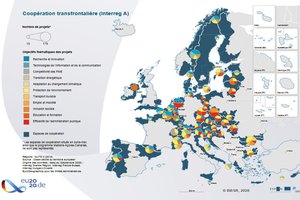News
Adoption of the New Leipzig Charter and the European Territorial Agenda 2030
January 2021
On 30 November and 1 December, at the informal meeting of ministers responsible for urban development and territorial cohesion organised by the German EU presidency, two important documents for Europe’s territories were adopted: the New Leipzig Charter and the Territorial Agenda 2030.
As intergovernmental documents covering policy areas in which the EU does not necessarily have competence, but supported by the Commission – they are in line with the Green Deal and the Just Transition Mechanism – they constitute common benchmarks for the coming years for European countries in the broad sense (including Switzerland), which is precious for players involved in cross-border cooperation. They will be able to draw on them to promote the European Cross-Border Citizens Alliance and to contribute to the Conference on the Future of Europe.
Following on from the Territorial Agenda 2020 (adopted in 2011), the Territorial Agenda 2030, subtitled “A future for all places”, for its part sets out the priorities for countries in the area of territorial development for the coming decade. Noting the growing inequalities within and between European territories, and deeming that the territorial dimension of policies should be strengthened, the document stresses the need for close coordination between all levels of governance, and sets forth six common priorities (including the circular economy) within the framework of two overall goals: a Just Europe that offers future perspectives for all places and people; and a Green Europe that protects common livelihoods and shapes the societal transition.
The document particularly emphasises the issues of the interdependence of territories, functional regions, integration across borders and efforts to overcome obstacles to cooperation. Following the MOT’s intervention, it promotes cross-border co-development and the involvement of citizens across borders.
The Territorial Agenda 2030 will notably be implemented by means of pilot actions – six have already been proposed – to address the challenges identified and bring together different EU governments and territorial authorities. One of the actions will focus directly on cross-border issues: “Cross-border spatial planning – a zero carbon vision for the functional cross-border region”, proposed by Luxembourg. A document devoted to the implementation of the Territorial Agenda gives numerous cross-border examples.
The updated Leipzig Charter
Subtitled "The transformative power of cities for the common good", the New Leipzig Charter: […]
- covers different levels of intervention (from the neighbourhood to the functional and metropolitan area);
- sets out the three dimensions of the European city of the future (for a green, just and productive city);
- reinforces certain key principles for the governance of cities (the territorial approach, the integrated approach and multi-level governance, etc.), and incorporates new ones (urban development for the common good, public participation and co-creation);
- establishes digitalisation as an inter-sectoral dimension.
Europe has thus equipped itself with a strategic framework to support European cities and metropolises, where 75% of its population live, with an implementation document based on the new charter making the EU’s Urban Agenda (adopted in 2016 in Amsterdam) an operational tool to achieve its objectives.All of Europe’s territorial players are therefore encouraged to disseminate and put into practice the principles of the New Leipzig Charter and the Territorial Agenda 2030 in order to contribute to the transition to a more sustainable and resilient Europe.
More information :
- Press release of the German presidency: download the New Leipzig Charter for urban development
- Volkmar Vogel concludes the European Territorial Agenda 2030
- #TerritorialAgenda 2030 - TerritorialAgenda
Back to list
